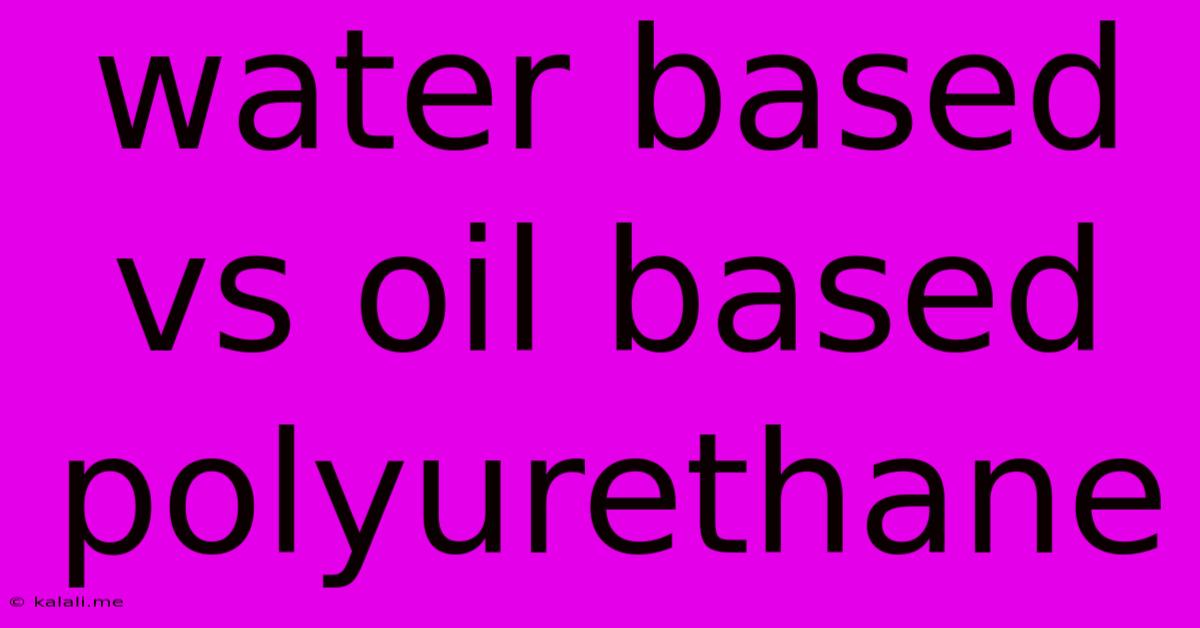Water Based Vs Oil Based Polyurethane
Kalali
May 24, 2025 · 3 min read

Table of Contents
Water-Based vs. Oil-Based Polyurethane: Choosing the Right Finish for Your Project
Choosing between water-based and oil-based polyurethane can feel overwhelming. Both offer durable protection for your wood projects, but they have distinct differences in application, cleanup, and final finish. This guide breaks down the pros and cons of each, helping you select the perfect polyurethane for your needs. Understanding these differences will ensure you achieve the best possible results for your woodworking, furniture refinishing, or flooring projects.
What is Polyurethane?
Polyurethane is a type of protective coating applied to wood surfaces to enhance durability, water resistance, and appearance. It creates a hard, clear finish that protects against scratches, stains, and moisture damage. The key difference lies in the solvent used: water or oil.
Water-Based Polyurethane:
-
Pros:
- Low Odor: Water-based polyurethane has significantly less odor than its oil-based counterpart, making it a more pleasant option for indoor use.
- Easy Cleanup: Cleanup is a breeze with soap and water, eliminating the need for harsh solvents.
- Fast Drying Time: Water-based poly dries much faster, allowing for quicker project completion.
- Low VOCs: Lower volatile organic compounds (VOCs) make it a more environmentally friendly choice.
- Better for Beginners: Its forgiving nature and easy cleanup make it ideal for DIY projects and beginners.
-
Cons:
- Less Durable (Generally): While modern water-based polyurethanes are remarkably durable, they generally offer slightly less protection against scratches and abrasion compared to oil-based options.
- Can Raise the Grain: Water can sometimes raise the wood grain, requiring extra sanding before applying subsequent coats.
- Susceptible to Water Damage (Initially): While water-resistant, it needs adequate drying time to reach its full water-resistant capabilities.
Oil-Based Polyurethane:
-
Pros:
- Superior Durability: Oil-based polyurethane offers superior protection against scratches, dents, and wear and tear, making it suitable for high-traffic areas and furniture subjected to heavy use.
- Deep, Rich Finish: Many woodworkers prefer the deeper, richer finish that oil-based poly provides.
- Self-Leveling Properties: Oil-based polyurethane tends to self-level better, resulting in a smoother, more even finish.
-
Cons:
- Strong Odor: Oil-based polyurethane has a strong, pungent odor that requires good ventilation during application and drying.
- Difficult Cleanup: Cleanup requires mineral spirits or paint thinner, which are harsh chemicals and require careful disposal.
- Slow Drying Time: Drying time is considerably longer, extending project completion time.
- Higher VOCs: Oil-based polyurethanes contain higher VOCs, contributing to air pollution.
Which Polyurethane is Right for You?
The best choice depends entirely on your project and priorities:
-
Choose water-based polyurethane if:
- You value low odor and easy cleanup.
- You're working on a smaller project indoors.
- You're a beginner or prefer a simpler application process.
- Environmental friendliness is a priority.
-
Choose oil-based polyurethane if:
- Maximum durability and scratch resistance are essential.
- You're working on a high-traffic area or piece of furniture that will experience heavy use.
- You prefer a richer, deeper finish.
Regardless of your choice, proper surface preparation – sanding, cleaning, and priming – is crucial for achieving the best results with either type of polyurethane. Always follow the manufacturer's instructions for application, drying times, and safety precautions. Investing time in proper preparation will lead to a beautiful and long-lasting finish.
Latest Posts
Latest Posts
-
Do I Need Cement Board For Backsplash
May 24, 2025
-
Can You Go From Synthetic Oil To Regular
May 24, 2025
-
Can I Open A 529 Plan For My Nephew
May 24, 2025
-
Why Does My Cat Want To Be Dirty
May 24, 2025
-
How To Ask For Relocation Assistance
May 24, 2025
Related Post
Thank you for visiting our website which covers about Water Based Vs Oil Based Polyurethane . We hope the information provided has been useful to you. Feel free to contact us if you have any questions or need further assistance. See you next time and don't miss to bookmark.